By: Dr. Serge Jurasunas, ND. M.D (hc) M.D (hom). Professor of Naturopathic oncology. Author of Cancer Treatment Breakthrough. Immuno-Oncology using the Rice Bran Arabinoxylan Compound. Recipient of Albert Schweitzer Award for Outsanding Achievement in Medicine 20023.
I am working with all types and grades of cancer, where breast cancer together with prostate cancer are the #1 patient cancers, I have treated during the past five decades in my clinic using nutrition and natural therapies with a more scientific approach.
The Doctor can only Suggest, but Nature is the True Healer of Disease.
Most of the cases coming to me have already been through surgery, chemotherapy, and radiation but for most suffering from recurrence also have bone metastasis. Some patients have been told by their doctors that chemotherapy or radiation is useless because the disease is already too advanced. But even in such cases with a very high PSA level and bone metastasis spread on bone and skeleton, we have obtained remarkable results with increased lifespan and good quality of life.
Over the past years treating advanced cases we managed to eliminate partially or totally, bone metastasis, decrease high levels of PSA from 690 up to 1260, down to a normal range in a one-year timeframe with remission for up to 10 years. In my new book on Immuno-Oncology and cancer, I am presenting several cancer cases including prostate cancer with complete hospital records and applied therapy. It shows that prostate cancer even with a metastasis condition is not always a death sentence.
Introduction to Prostate Cancer
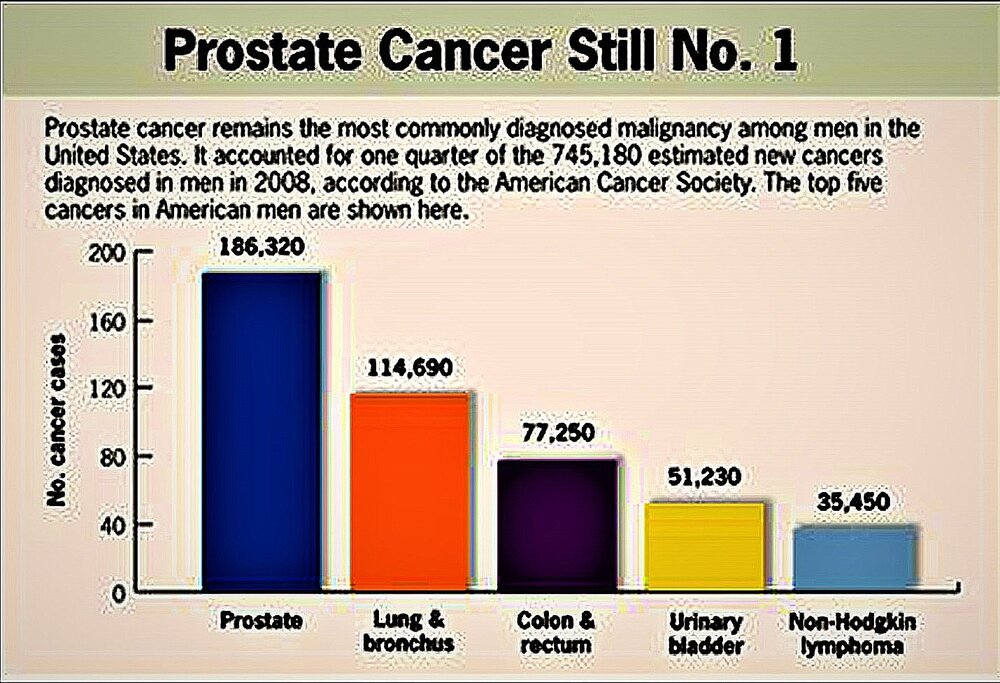
In North America, prostate cancer has become the #1 killer of men even now before lung cancer (1). Prostate cancer is considered mainly a disease of aging with most cases occurring in men over the age of 55, increasing with a higher rate for men over 65-70 years, although we have seen on several occasions prostate cancer with men 45 years and even younger. Most prostate cancers are asymptomatic and slow-growing, however, a third of the cases are more aggressive and fast developing. Prostate metastasis spreads relatively quickly to other parts of the body, particularly to the lymph nodes, bones, and brain, ultimately leading to death.
Currently, there is no cure for metastatic prostate cancer. Treatment of prostate cancer includes a classical combination of surgery, hormonotherapy, radiation therapy, and chemotherapy that may be effective for the cure of localized disease. However, this is subject to dormant metastasis and disease recurrence. The standard treatment regimen has serious limitations, including incomplete elimination of cancer while inducing toxicity to normal cells along with side effects (2).
The stage of the disease, detection of metastasis at the first diagnostic, and the aggressivity is mostly associated with the activation of certain oncogenes, activated cytokines such as the Transforming Growth Factors Beta, Pten, C-Myc; inactivation of tumor suppressor genes along with immune failure. The failure of cell-to-cell adhesion, braking of the basement membrane, activation of angiogenesis factors is responsible for metastasis invasion to other target organs which require as mentioned the loss or activation of certain genes and protein regulation.
For this reason, we need a molecular approach to cancer includes a holistic view of the disease. During the past 2 decades, a myriad of studies has demonstrated that oxidative stress may be one causal factor associated with the dysfunction or mutation of several genes such as the P53 tumor suppressor gene while today it is recognized that accumulated Oxidative stress triggers inflammation in the prostate contributing to the growth of the tumor (3).
Evasion from apoptosis is critical for tumor growth, cancer progression, and resistance to therapy, hence considered as a main hallmark in cancer (4). If damaged cells do not die from apoptosis they keep dividing unchecked, accumulating mutations until they turn into cancer cells. Now when cancer cells are not destroyed through the apoptosis pathway (a natural genetically programmed cell death) they accumulate mutation and become more resistant and start to proliferate.
Lifestyle is Associated with the Increasing Risk of Prostate Cancer
Of course, lifestyle and especially dietary style are highly associated with prostate cancer risk especially excess of meat, fat intake, little intake of fruits and vegetables rich in phytochemical agents, deficiency in vitamins, minerals, and oligo elements (chromium, selenium, zinc, vitamin E, and vitamin D) and an imbalance between omega 6 and omega 3. Zinc is critical for the prostate; a normal prostate has the highest levels of zinc in the body while malignant prostate tissues have significantly less zinc.
Zinc is important for the activation of T-cells in our immune defense. When elderly patients took 30mg of zinc a day for 3 months, the number of T-cells in their blood increased 30 percent but it can also restore NK cell activity. Deficiency in vitamin D is also associated with a higher risk of prostate cancer. Vitamin D increases NK cell activity and inhibits suppressive cell types such as Treg cells that inhibit immune cell activity for example, from NK cells that are supposed to attack cancer cells.
Remember that with age NK cell activity become less activated and less powerful to kill cancer cells. One other factor associated with prostate cancer that I mentioned above is the role that oxidative stress plays. This association with prostate cancer has already been recognized for over 2 decades. Several clinical studies have proven the role of oxidative stress and chronic inflammation in the development and progression of the disease (5).
In fact, we know that the aging process in humans includes a dramatic decrease in the production of endogenous antioxidants in most tissues, including the brain. This results in the increased production of free radicals having damaging effects on cellular components and tissues. The observation through the Oxidative dried blood layer test, I have used over the past 40 years to inform us about the stage of the oxidative stress and inflammation, which correlates with the progression of the disease.
In fact, recent studies have indicated that oxidative stress is higher in the epithelium of prostate cancer than in men without the disease. Therefore this indicates increasing free radicals activity from antioxidant deficiency.

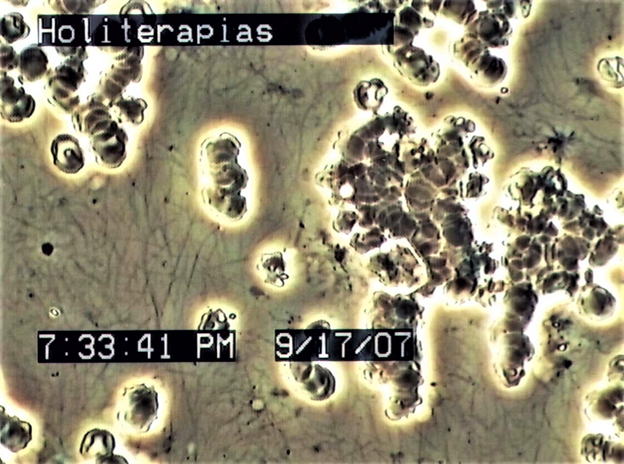
Advanced Case of Prostate Cancer. RBCs in the Form of Very Dense Rouleaux Showing a High Oxidation Process. Lipid Metabolism Dysfunction, Poor Food Intake, Bacterial Infection, Spicules Like Needles Visible all over the Blood Drop. Shows Very Bad Liver Condition, Usually from Chemotherapy Side Effects and Wrong Food. The Red Cells are Damaged, Broken, and Infected. Oxygen cannot be Absorbed or Sufficiently Circulated to Supply all the Body, inducing a state of Hypoxia that increases Tumor Aggressivity.
However, chemotherapy itself may also increase oxidative stress-inducing chronic inflammation that in turn stimulates the progression of the disease. Again at this level, I am checking the patient inflammatory condition before and after chemotherapy and at different intervals. This is one way to follow and prescribe if necessary some selected antioxidant compounds to reduce inflammation. Observation via Live Blood Analysis is also important in order to screen the real blood condition according to the nutritional and dietary lifestyle of the patient. The oxidative stress level and other important factors are associated with the disease and the damaging effect of chemotherapy.
Another main factor linked with cancer and prostate cancer is the dysfunction of the mitochondria through Mt-DNA mutations, very frequent in most cancer, and altered metabolism that contributes to tumor pathogenesis and metastasis (6). For this reason, cancer is today viewed as a metabolic disease and not only as a cellular disease. Prostate cancer makes no exception; in fact, this mitochondrial mutation can increase the aggressivity of prostate cancer (7). Restoring the mitochondrial function and cellular respiration using several dietary agents, enzymes, vitamins, and minerals is an important step that permits us to combat cancer with more efficiency (8).
Chemotherapy and Hormonotherapy are Not the Best Answer
The use of hormones and or chemotherapeutic drugs could only extend the lives of these men by months or a few years at best and often with pain and poor quality of life. I believe that treating any cancer first needs a complete image of the whole patient. Our approach includes dietary style and a molecular approach to underline the mechanism of both apoptosis and anti-apoptotic genes or inhibitors.
These, in turn, indicate the balance between cancer cells self-destroyed by chemotherapy and the resistance of other populations of cancer cells to apoptosis. Usually, I work with molecular markers blood testing where the reader can refer to one of my articles called, “The Molecular Basis of Prostate Cancer and Targeting Therapies”, Published in Townsend Letter August-September 2017. Here I explain in detail the various mechanisms of prostate cancer and suggested therapies.
Survivin, a New Inhibitor of Apoptosis, is Highly Activated in Prostate Cancer
Citing just one example, Survivin is a gene inhibitor of apoptosis only activated in cancer tissue but not in healthy tissue therefore survivin becomes a new cancer biomarker and a new molecule for early detection, diagnostics, and prognosis of various types of cancer (8, 9). Now in all the cases described, the survivin tests were always highly activated and therefore contribute to chemotherapy resistance to apoptosis, cancer cell destruction, and tumor aggressivity (10).
The level of survivin is different from one patient to another, having shown that each patient is an individual and needs personalized therapy. This is why conventional therapies often fail because they are adapted to focus on the tumor and not on the patient’s bodily defense mechanisms. I cannot begin to tell you how many times I’ve seen a patient going under surgery for prostate cancer and 3 months later the PSA starts to increase! Usually, it is because some remaining cancer cells developed mutated P53 protein that blocks apoptosis, and their cancer cells start to activate.
Prostate Cancer Prevention through Selected Natural Dietary Compounds
Many natural dietary compounds have been found to possess anticancer activity by regulating, activating, or inhibiting several genes and pro-inflammatory factors called cytokines, including
P53, Bax, BcL2, Survivin, MMP’s, TGF-B, NF-KB, Cox2, PI3K, Caspases, while stimulating the immune defense. Apoptosis is the first step that occurs in the destruction of abnormal/cancer cells through the P53 tumor suppressor gene, considered as an anticancer therapy (11). Evidence indicates that dietary bioactive agents may trigger apoptosis through numerous molecule targets describe above.
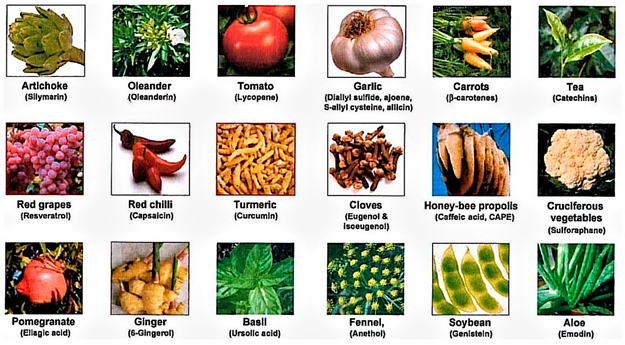
List of Natural Dietary Agents
Curcumin, Lycopene, Genistein, Resveratrol, Polyphenols, Epigallocatechin Gallate, (EGCG) from Green Tea, Sulphoraphane, Isothiocyanate, Lutein, and Allicin.
Curcumin, lycopene, genistein (from soya bean, tofu), and resveratrol are the top natural bioactive agents with anticancer properties and can protect against prostate cancer. For instance, genistein can target cancer in several directions including apoptosis, angiogenesis, preventing metastasis invasion. It can even decrease telomerase activity that turns cancer cells practically immortal (12).
In the form of a concentrated supplement, genistein can regress prostate cancer (13). Lycopene is also an anticancer agent fighting prostate cancer (14). Lycopene may be found preferably from organic vegetables and fruits like tomatoes, guavas. Watermelon, pink grapefruit, papaya, apricots but also in the form of a supplement to treat prostate cancer.
My first suggestion is a high consumption of cruciferous vegetables, including broccoli, cauliflower, Brussels sprouts, watercress that contain a high level of sulphoraphane and isothiocyanate.
Tomatoes are a good source of lycopene however when cooked or in form of juice, they contain as much as 10 times more content in lycopene.
Other important vegetables and fruits include radish, black radish, berries, strawberries, raspberries, walnuts, and pecans.
Mushrooms are indicated in this diet at least twice a week. Mushrooms help fight cancer by modulating the immune system. They contain a compound called beta-glucan, the most common medically active ingredient known as polysaccharides from the cell walls of mushrooms, and proteins (15). Beta-glucans increase T-cell proliferation and NK cell activity.
Drink one cup of raspberry juice once a week.
In season, drink one glass of watermelon juice rich in lycopene and beta carotene.
Eat raw pumpkin seeds, very rich in zinc. You can grind them and eat them several times a week mixed with other food, salads, etc. Also, use cold-pressed pumpkin seed oil routinely in your kitchen to prevent prostate cancer. Pumpkin seeds are also rich in fiber and thus excellent to increase intestinal transit. In season, eat organic grapes twice a week or drink red grape juice such as from the Concord grape developed by a farmer named Ephraim Bull in Concord.
Drink pomegranate juice twice per week, Pomegranate juice has strong potential for prostate cancer chemo-prevention. It induces cell-cycle arrest, apoptosis and inhibits VEGF, a strong angiogenesis molecule. In France, Professor K. Kahyat, an Oncologist mentioned pomegranate as one top anti-cancer foods in his list of the best foods against cancer.
Eat one glass full of raspberries at least once or twice a week better on an empty stomach or with yogurt. Eating other foods before ingesting raspberries can destroy ellagic acid.
Drink at least 3 cups of green tea per day. It contains polyphenols, flavonoids which are strong antioxidants and together with catechins has been shown to slow or prevent the development of prostate cancer.
Other foods include fish, such as mackerel, herring, salmon, and sardines. These can reduce the risk of developing prostate cancer by one-third.
Reduce the consumption of red meat that contains hormones, arachidonic acid that increases inflammation which we know today can predispose an individual to cancer which includes prostate cancer (16).
Reduce your intake of sugar and sugar drinks.
Reduce or avoid the consumption of dairy foods that increase prostate cancer risk and disease recurrence. Fat and excess of calcium decrease vitamin D, increase the Insulin-like growth factor decreasing immune response (17). Choose Organic Foods when possible organically grown food is free from harmful chemicals and pesticides, some of which have been recognized as carcinogenic including BPA, a known prostate cancer carcinogen. Also, organic foods have more nutrients and taste better. Maintaining a healthy diet can help you to prevent prostate cancer, support your treatment, or prevent a recurrence.
Treatment for Prostate Cancer
As with any other cancer, prostate cancer needs a holistic approach addressing the tumor itself, tumor microenvironment, immune defense, and the whole body function. This includes the liver, colon, microbiome, nervous system, and the inhibition of glycolysis, where if possible an approach evaluating the molecular markers through blood testing, using in the treatment a variety of selected natural bioactive agents that have demonstrated anti-cancer properties.
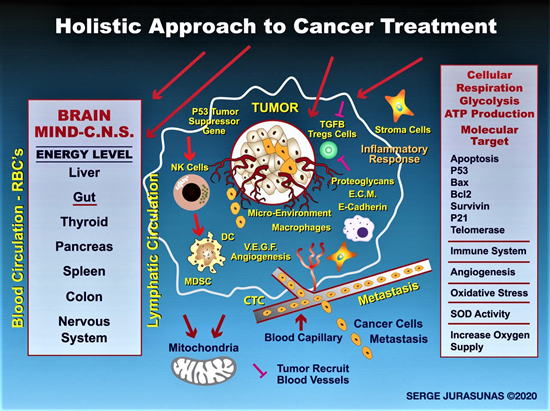
My Protocol for the Treatment of Prostate Cancer
During the past decades, I developed various protocols for prostate cancer that we refined over time. The goal of the treatment is based on targeting several cancer mechanisms that in turn inhibit or destroy prostate cancer cells while training the whole body as previously explained. Dietary style is also important both to prevent prostate cancer or during a chemotherapy regimen. Reducing oxidative stress, practicing some exercises, or walking in fresh air is also beneficial. Exercise is suggested to reinforce immune activity. Dr. Dean Ornish, from the University of San Francisco, showed that a plant-based diet and lifestyle changes could reverse the progression of prostate cancer.
The result of these studies with two groups of prostate cancer was followed during several months and results were published in 2008 with a group of colleagues in Lancet Oncology showing that comprehensive lifestyle and dietary style changes can modify several genes, decrease telomerase activity (See my article: “Cancer Update, New Theories, and Advances in Cancer Treatment”, Townsend Letter, Cancer issue August/Sept 2020 (62-66), inhibiting angiogenesis favoring cancer suppression. In 2005, Dean Ornish and colleagues published a full study about the intensive Lifestyle changes and how it may affect the progression of prostate cancer (18).
NATURAL ANTICANCER COMPOUNDS
If you have prostate cancer and are under conventional treatment, with either chemotherapy or radiation therapy, a combination treatment protocol utilizing bioactive natural agents enhances cancer therapy efficacy. Most of the phytochemical agents work in synergy with chemotherapy or radiation therapy and thus increase efficacy by killing more cancer cells while protecting healthy tissue. It means that bioactive natural agents have absolutely no toxicity or side effects as so many patients may think.
Our List of the Natural Anti-Cancer Agents
Biobran: A strong immunomodulator manufactured exclusively in Japan that I have included in all my cancer protocols over the last 25 years that activates immune cells such as T-cells, macrophages, dendritic cells may and especially NK cells up to 500%. This compound made from rice bran arabinoxylan cultivated on enzyme of shitake mushrooms possesses several anticancer properties which are particularly efficient with prostate cancer (19). Biobran is a well-known tradename in Europe and Asia, but also known in the US as BRM4 or Peak Immune 4. in Australia.
We also call it Rice Bran Arabinoxylan (RBAC). My new book is based on the presentation of this compound, how it works with conventional therapies, how it increases lifespan, how it kills cancer cells, how it works in synergy with various natural agents all scientifically documented, and of course together with a large chapter on live clinical cases. RBAC is particularly efficient in treating prostate cancer, used by many doctors and oncologists in various countries. In Japan RBAC (Biobran) is used in many hospitals conjointly with chemo-therapies and in many private clinics.
Take 3, one-gram sachets per day after each meal or 4 tablets per day.
Prostasol: An interesting combination made from herbs and roots, such as curcumin, lignans, saw palmetto extract, ginseng, reishi, Japanese knotweed which is a rich source of resveratrol and quercetin, etc.. Prostasol is used with success in Europe for prostate cancer and entered into the protocol of Prof. Ben Pfeiffer director of reseach at the Aesculape klinic in Switzerland together with Biobran and curcumin. (Medpro Lab Holland)
Take two tablets twice per daily with water, before or after breakfast and dinner.
Liposomal curcumin: Take about 2000-3000 mg per day divided 3x.
Curcumin the active ingredient of turmeric is know s a polyphenols compound with multiple anticancer activity. `Curcumin enhance the level of P53 gene and proteins which in turn induces Bax expression and to an elevated Bax|BcL2 ratio and dead of cancer cells, Curcumin dowregulate NFK-B expression that in turn inhibit apoptosis, the immune cells and increase angiogenesis pathway. Tegaran. A special patented formula made from fermented soya that contain phytic acid,protease inhibitors, saponins, phytosterols and genistein. Tegaran is one or the most effective anticancer agents adapted to various types of cancer but specialy prostate cancer.
Tegaran up regulated Bax gene expression , down regulated BcL2,inhibit VEGF and MMP 7 and MMP9 in the angiogenesis, decrease MDR and increase the effectiveness of chemotherapy. I widley use Tegaran with my cancer patients and specialy with elderly patients to improve their energy and physcial condition, cascade. Tegaran is available in Switzerland, Germany and US. (see my article The Molecular Basis of Prostate Cancer and Targeting Therapies. Townsend Letter, August\Sept 2017).
In case of prostate cancer with bone metastasis
Asaigermanium. (organo- Germanium) is a semi-metal and semi-conductor developed by the Japanese K Asai at the Asai Germanium Research Institut with remarkable anti-cancer properties. I have used organic germanium since I first meet with K. Asai during a congress that I organized in France in 1973. Organic germanium increases oxygen supply and flow in the body, increases the production of interferon (IFN-y) the most important cytokine that in turn activate NK cells macrophages and dendritic cells.. GE-132 has electromagnetic properties that disturb the membrane of cancer cells so they die more easily.
Organogermanium work as a antioxidant by stimulating the production of endogenouss antioxidant enzymes such SOD, CAT and Glutathione. Oxidative stress is higher in prostate cancer and usually Cox2 is actived increasing inflammation,angiogenesis and inhibit immune cells activity Germanium stimulates the endorphins in the body, therefore decreasing or eliminating pain. Germanium is quite efficient in preventing metastasis or in reducing or eliminating bone metastasis. Asaigermanium I very efficient in case of advanced cancer with metastasis.
Fake product Alert
Be sure to take Asaigermanium manufactured only through the Asai Germanium Research Institut in Japan since many fake germanium products are sold online with no effects and sometime harmful. The fake products are sometime falsely claim that there product is from Asai-Germanium that is not true. For genuine and real Asaigermanium (Asai-Germanium) visit https://asaigermanium.com
Enzyme Yeast Cell: Developed and manufactured in Germany in 1969 by Dr S, W under the theory of the cellular respiration by Otto Warburg (Nobel Prize in Medicine) Enzyme Yeast Cells (Zell-Oxygen) has been the bedrock of my treatment for over 50 years. Zell-Oxygen is a natural preparation exclusively from live yeast cells similar to human cells that contain all the vitamins, minerals, proteins, biocatalyzers, nucleic acid, enzymes of the Krebs cycle, mitochondria sequence, etc.. to restore and detoxify the whole body. It also regenerates mitochondria function and increases cellular respiration that in turn decreases the glycolysis pathway use d by the tumor as energy fuel instead of oxygen.
Enzyme yeast cells contain all the vitamins, minerals, enzymes, antioxidants that our body need and specaily Enzyme yeast cells also contain Beta-glucans to activate the immune system such T-cells, macrophages,and NK cells that in turn produce IFN-y the most important cytokine. Enzyme yeast cells is one main holistic approach to cancer (20). I have widely use Zell-oxygen on thousand of patients including all types of chronic and dgenerative disease but specialy with cancer as the basis to regenerate the body and reactivate the cellular respiration. Zell-oxygen is also important to detoxify the body, liver, blood, lymphatic system.
Since I am using Live Blood analysis for over 40 years I am in position to observe intoxicate blood with oxidize lipid, heavy cristals,toxins,invasion of bacteria and yeast form like candida,abnormal or broken red blood cells from heavy oxidatrive stress and we can improve this pattern by using Enzyme yeast cells or Zell-oxygen. Also very important over the years I have observed that Zell-oxygen can reactivate mutant P53 to normal WT function and so activate apoptosis and the death of cancer cells.
Additional Supplementation: Selenium, , omega 3, vitamin D, zinc, garlic and onion extract, green propolis.
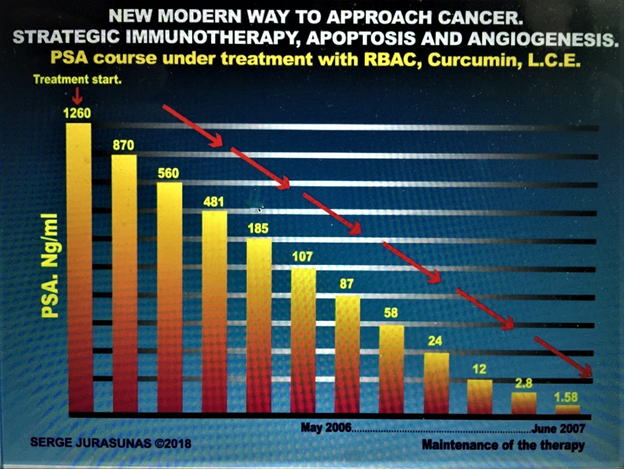
Recommended Foods
All cruciferous vegetables, red beet, turnip, kombu, tomatoes;
We favor fermented vegetables or fermented vegetable juices, such as Biotta. Tomatoes, sauerkraut, black radish.
Fruits: Watermelon, apples, berries raspberry, strawberry.
Seeds: Nuts, seaweed.
Mushroom (shitake etc.)
Drink large quantities of green tea.
Tofu, seitan,
Ground flax seeds at least three times a week.
Foods that Should be Avoided:
Eggs, red meat, mayonnaise, milk and milk products, saturated fats.
Detoxification: We cannot ignore that detoxification is important since often prostate cancer develops in men with obesity or from intoxication from an excess of industrial foods, animal fats, and heavy metals such as arsenic and mercury. Take note of the references in my book, “Health and Disease Begin in the Colon”, pp220-230 and also pp270-275, concerning the metabolic action of enzyme yeast cells for a 7-day detoxification program, together with a list of foods and details on the value of organic vegetables.
important articles available online:
“Protocol for the Treatment of Prostate Cancer”.
“Can Food Diet Prevent and be Efficient in Cancer Treatment?”
New book: “Cancer Treatment Breakthrough – Immuno-Oncology using Rice Bran Arabinoxylan Compound”.
References:
1– Prashanth Rawia, Epidemiology of prostate cancer. World J. Oncol. 2019 April 10 (2) 63-89.
2- Mettlin C. Recent developments in the epidemiology of prostate cancer, Eur. J. Cancer, 1997, 33-340-347.
3- Laksmanipathi Khandrika. Binod Kumar. Role of oxidative stress in prostate cancer. Cancer Lett. 2009. Sept 18. 282 (2) 125-136.
4- Mc Kenzies, Kypritanon N. Apoptosis evasion. The role of survival pathways in prostate cancer, progression, and therapeutic resistance. J. Cell. Biochem. 2006-97 (1)-18.
5- Emily Shacter Ph.D. Chronic inflammation and cancer. Oncology. Vol 16. Ne 2. February 2002
6- Julia F. Hopkins, Veronica Sabelnykova, Paul J Boutros. Mitochondrial mutation drives prostate cancer aggression. Nature communication 8, Article number 656. 22 September 2017.
7- Julia F Hopkins, Veronica Y, Sabelnykova, et al. Mitochondrial mutations drive prostate cancer agression. Nature Communications 18. 656. Article DOI. 10.1038\s41467-017-00377
8- Michael J. Gonzalez et al. Mitochondrial correction. A new therapeutic Paradigm for cancer and degenerative diseases. Journal of Orthomolecular Medicine. Vol 33 N.4. August 2018.
9- M.E Johson and E.W Howerth. Survivin, A Bifunctional Inhibitor of Apoptotic Protein. Veterinary Pathology. 2004.41-599.
10- Kajiwara Y, Yamasaki F, Haama S et al. Expression of survivin in astrocytic tumors. Correlation with malignant grades and diagnostics. Cancer (Phila) 2003-97- 1077-83.
11- Asfaq R. Survivin expression is associated with features of biologically aggressive prostate cancer. Cancer 2004. 100-751-757.
12- Wei Hu, John J Kavariagh. Anticancer therapy targeting the apoptotic pathways. The Lancet Oncology. Vol 4, December 2003.
13- Janet M Pavese, Rebecca L, Farmer. Inhibition of cancer cell invasion and metastasis by genistein. Cancer Metastasis Rev. 2010. Sept 29 (3) 465-482. 14- Mohamet A. Galfar M.D. Erica Golliday M.A. Regression of prostate cancer following administration of Genistein combined Polysaccharide (GCT TM) a Nutritional Supplement. A case report. The Journal of Alternative and Complementary Medicine. Vol 8, Number 4. 2002. 493-496.
15- Karen Dahau MA, Mildieed Fennal Ph. D, Nagi B Kumar Ph. D. Lycopene in the prevention of prostate cancer. International Journal of the Society of Integrative Oncology. Vol.6 N.1-2008. 29-36.
16- Alena G. Guggenheim. ND. Kirsten M, Wright BS, Heather L. Zwickey Ph.D. Immune Modulation From Five Mushrooms. Application to Integrative Oncology. Ontegrative Medicine. Vol 13, N.1 February 2014
17- Rashmi Suka, Yikyung Park, and Amanda J. Cross. Meat and Meat- related compounds and risk of prostate cancer in a large `prospective cohort study in the United States. American Journal of Epidemiology by Oxford University Press. July 31. 2009.
18- Yang M, et al. Dairy intake after prostate diagnosis in relation to disease-specific and total mortality. Intl. Journal of Cancer. 2015.137.2462-2469
19- Dean Ornish et al. Intensive lifestyle changes may affect the progression of prostate cancer. The Journal of Urology, Vol 174- 1065-1070 Sept. 2005,
20- Serge Jurasunas. NK cell-based Immunotherapy in Treatment of Cancer using a New Compound Rice Bran Arabinoxylan. Townsend Letter. August/Sept 2019
21- Serge Jurasunas. The Clinical Evidence of Cellular Respiration to Target Cancer. (Available online)
22- Serge Jursunas. The Therapy of Enzyme Yeast Cells in Cancer Disease, CFS and Aging Process, Natipress publication. Portugal.(available online)
23. Serge Jurasunas. Effective Cancer Treatment Methods by Serge Jurasunas. How Effective is Asaigermanium in cancer patients. Japan Medical Journal, (available online) 23. Effects of Asaigermanium on Immunity. Asai Germanium Research Insititut. Japan.
report. The Journal of Alternative and Complementary Medicine. Vol 8, Number 4. 2002. 493-496.
15- Karen Dahau MA, Mildieed Fennal Ph. D, Nagi B Kumar Ph. D. Lycopene in the prevention of prostate cancer. International Journal of the Society of Integrative Oncology. Vol.6 N.1-2008. 29-36.
16- Alena G. Guggenheim. ND. Kirsten M, Wright BS, Heather L. Zwickey Ph.D. Immune Modulation From Five Mushrooms. Application to Integrative Oncology. Ontegrative Medicine. Vol 13, N.1 February 2014
17- Rashmi Suka, Yikyung Park, and Amanda J. Cross. Meat and Meat- related compounds and risk of prostate cancer in a large `prospective cohort study in the United States. American Journal of Epidemiology by Oxford University Press. July 31. 2009.
18- Yang M, et al. Dairy intake after prostate diagnosis in relation to disease-specific and total mortality. Intl. Journal of Cancer. 2015.137.2462-2469
19- Dean Ornish et al. Intensive lifestyle changes may affect the progression of prostate cancer. The Journal of Urology, Vol 174- 1065-1070 Sept. 2005,
20- Serge Jurasunas. NK cell-based Immunotherapy in Treatment of Cancer using a New Compound Rice Bran Arabinoxylan. Townsend Letter. August/Sept 2019
21- Serge Jurasunas. The Clinical Evidence of Cellular Respiration to Target Cancer. (Available online)
22- Serge Jursunas. The Therapy of Enzyme Yeast Cells in Cancer Disease, CFS and Aging Process, Natipress publication. Portugal.(available online)
23. Serge Jurasunas. Effective Cancer Treatment Methods by Serge Jurasunas. How Effective is Asaigermanium in cancer patients. Japan Medical Journal, (available online) 23. Effects of Asaigermanium on Immunity. Asai Germanium Research Insititut. Japan.
